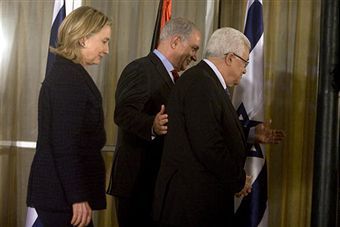 When the Obama administration started its latest Middle East initiative, it was amid
great fanfare. I blogged – sceptically — about the optimism exuding from the State Department at the time. Now, however, the US government has given up its push for a freeze in Jewish
settlement construction as quietly as possible. As Martin Indyk of the Brookings Institution puts it: “The Middle East peace process just died, but nobody seems to be in mourning. Twenty
months of U.S. efforts to freeze Israeli settlement activity to create a conducive environment for negotiations have produced only deadlock.”
When the Obama administration started its latest Middle East initiative, it was amid
great fanfare. I blogged – sceptically — about the optimism exuding from the State Department at the time. Now, however, the US government has given up its push for a freeze in Jewish
settlement construction as quietly as possible. As Martin Indyk of the Brookings Institution puts it: “The Middle East peace process just died, but nobody seems to be in mourning. Twenty
months of U.S. efforts to freeze Israeli settlement activity to create a conducive environment for negotiations have produced only deadlock.”
Keen for the demise of the latest US effort to be seen favourably, Hillary Clinton gave a speech on Friday saying that the United States was still committed to a Middle East peace agreement and would revert to its earlier strategy of shuttling between the Israelis and the Palestinians. But there is no talk of the earlier push for direct talks between Prime Minister Benjamin Netanyahu and the Palestinian president, Mahmoud Abbas.
What will happen now? There are rumours of the US administration pushing to shake up Netanyahu’s coalition, to give the Israeli Prime Minister a freer hand in negotiations. That may explain why Clinton met with Israeli opposition leader Tzipi Livni last week. But internal interference in Israeli politics rarely comes off they way it is planned. Meanwhile, US special envoy George Mitchell will meet with Netanyahu in Jerusalem on Monday evening and President Mahmoud Abbas in Ramallah later in the week.
The brunt of the pressure will likely be on Israel because the Palestinians Authority, unlike the Israelis, have submitted their opening positions on all the core issues – borders, security, Jerusalem, refugees, water and the settlements. And the Netanyahu government does not look like it is ready to talk about the key issues, preferring to focus on economic and even environmental matters. So for now, things will be pushed off into the distance. Or to quote Yevgeny Primakov, a former Russian prime minister: “There is reason to believe that because of the current circumstances, efforts to achieve an Israeli-Palestinian peace settlement can be postponed until better times.”






Comments